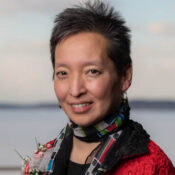
Speaker
Jennifer Edgoose
Professor; Doctor of Family Medicine
Jennifer Edgoose, M.D., M.P.H., is professor, executive vice chair, and vice chair of Community Health, Diversity, Equity and Inclusion in the Department of Family Medicine and Community Health at the UW School of Medicine and Public Health. Dr. Edgoose graduated from Wellesley College with a B.A. in biological chemistry; Columbia University with an M.D. and M.P.H.; and the University of Washington for her family medicine residency. She then practiced full-spectrum family medicine for more than 10 years at Community Health Care, a federally qualified health center in Tacoma, Washington. She joined UW in 2010 and focuses on the care of historically marginalized populations and strategies to promote health equity and community engagement clinically, educationally and in research. Nationally, she served on Family Medicine for America’s Health – Health Equity Team and was the lead editor of the American Academy of Family Physicians’ Health Equity Curricular Toolkit. Dr. Edgoose is a recipient of the Baldwin E. Lloyd Faculty Teaching Award, Brillman Mentoring Award, Scheckler Faculty Research Award, and the UW–Madison Outstanding Women of Color Award.
Speaking in
Striving to Become an Antiracist Department: Strategies for Sustained Engagement and Transformation
In response to the global social justice movement of 2020, the members of the Diversity, Equity and Inclusion Committee in the UW–Madison Department of Family Medicine and Community Health set out to develop and execute an “antiracism 2.0” proposal for the department, which would build on the innovative strategies from their 2014 DEI Initiative. In this session, panelists will share strategies for building the capacity to develop an antiracist, multicultural department in a sustainable way.
The panelists will share the results of an internal climate assessment and a racial equity and inclusion assessment. They will discuss how they incorporated introspective opportunities for personal learning and growth; shared spaces for groups to learn together and build a culture of belonging in the department; and developed institutional strategies for change with a goal to build infrastructure, capacity, partnerships, and leadership to assure enduring change. The session hopes to inspire attendees to pursue change in their own departments and units across campus.